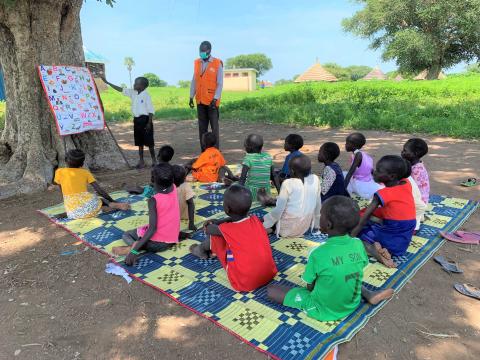Revitalizing Education: A call to action for a better learning environment in South Sudan

The world celebrates the International Day of Education on January 24th, with the year's theme "Changing course, transforming education".
Conflicts and natural disasters often result in the disruption of education due to the destruction of capabilities including infrastructure. Interruptions leave millions of children behind.
In South Sudan, a staggering two million or so children are out of school. Interventions in such contexts often focus on critical life-saving measures with education being left at the mercy of extra resources.
Education in emergency programs rightly prioritize setting up temporary learning sites, provision of scholastic materials, and ensuring the continuation of basic numeracy and literacy instructions.
These activities sometimes are bare minimum and with intentions to provide child-friendly spaces and "keeping the lights on" approaches. To turn around the current dire state of education in South Sudan, all stakeholders should focus on a few game changers:

Equip parents and caregivers
Strengthening the role of parents and community structures as integral partners in education. Parents and caregivers working together with education providers bring irreplaceable advantages.
As in many post-conflict programs that provide basic social services, education in emergencies programs generally lacks meaningful parental or caregiver involvement. Under any circumstance, this is a game-changer and must be prioritized.
Social and cultural norms and practices put undue pressure on girls forcing them to miss out on education.
Provide resources and more support
Child marriage and lack of access to basic sanitary supplies and facilities are some of the main hindrances. Programs must make special considerations to help them continue learning.
Education facilities, including temporary learning sites, for instance, should have sex-separated basic sanitation facilities.
Children with special needs are often neglected and lack access even to the basic services others enjoy. Programs should commence any such interventions with a comprehensive vulnerability analysis for better-informed intervention designs.

Access to school meals
Complementary activities such as school meal programs play a significant role in attendance, retention, and performance. Direct food assistance such as supported by the World Food Programme or even better, strengthening of homegrown school meal programs will bear far-reaching positive results.
Education is everyone's fundamental right and a necessity. A change in the course needs to promote equity and inclusion as key drivers and deliverables.
With a commitment to revitalize education for a better South Sudan through initiatives such as Education Cannot Wait and others, World Vision supports the call to "change course and transforming education".
By Dr. Mesfin Loha, Country Director
More on World Vision's vision for quality education here.